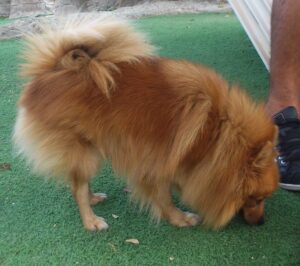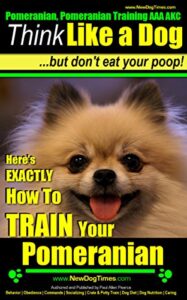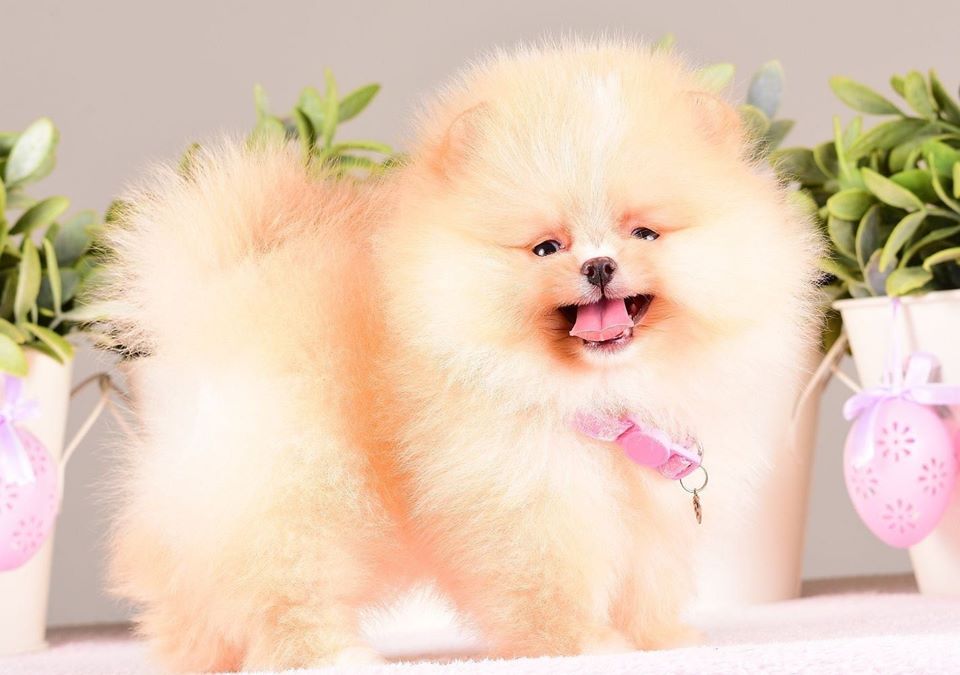The Secrets of Successful House Training Your
Pomeranian Puppy
 I receive so many emails regarding toilet training or should I say toilet training gone wrong! House training your Pomeranian puppy requires much patience and perseverance in the first weeks. House training your new Pomeranian Puppy can easily turn into a challenging process for you both. It doesn’t have to be that way though. There are a ton of methods for potty training a Pomeranian Puppy. They are not all created equal, but several of them have been proven very effective. No matter what method you decide to use, however, it is important to keep a few things in mind as you begin the process. These tips will benefit you in the long run and set the stage for the creation of a long and happy relationship between you and your dog. If you have purchased your puppy from a reputable registered breeder your task will be so much easier. Puppies born and reared in dirty condtions will be very hard to house train if not impossible to completely house train. Most breeders will have already commenced training your new baby to potty on dog pads or a litter tray.
I receive so many emails regarding toilet training or should I say toilet training gone wrong! House training your Pomeranian puppy requires much patience and perseverance in the first weeks. House training your new Pomeranian Puppy can easily turn into a challenging process for you both. It doesn’t have to be that way though. There are a ton of methods for potty training a Pomeranian Puppy. They are not all created equal, but several of them have been proven very effective. No matter what method you decide to use, however, it is important to keep a few things in mind as you begin the process. These tips will benefit you in the long run and set the stage for the creation of a long and happy relationship between you and your dog. If you have purchased your puppy from a reputable registered breeder your task will be so much easier. Puppies born and reared in dirty condtions will be very hard to house train if not impossible to completely house train. Most breeders will have already commenced training your new baby to potty on dog pads or a litter tray.
Number one rule is to restrict puppy’s unsupervised access to your home. The biggest mistake anyone can make is to bring your new Pomeranian baby home, let baby run around your home for a few days going to potty anywhere and then deciding to start potty training. Your home will smell like puppies potty place everywhere and your task will be a lot harder and slower to achieve. The Pomeranian puppy is kept in a playpen with clean newspaper down, food, water and a comfortable bed at the other end of the playpen. The Pomeranian puppy sleeps in this area and when I have to go out I leave the baby Pomeranian confined to the playpen.
As soon as puppy wakes up I take him or her outside to the area I want puppy to use as a potty area. I also take puppy to this area after meals and reward puppy when he or she has done the right thing with heaps of cuddles and tell puppy how clever and good he or she is. This takes a lot of patience and you must persevere, but doing this right in the first few weeks will pay in the long term. Accidents do and will happen.
DO NOT SMACK PUPPY OR ATTEMPT TO RUB HIS NOSE IN HIS ACCIDENT.
Immediately take the puppy to the potty area. Clean up the accident immediately and ensure there is no lingering smells or puppy will use this area again and again. If your puppy has been using a puppy pad or newspaper you can place either item in the place outside you want baby to use as the potty area. The smell will help the puppy associate this area with going to the toilet.
Helpful items to aid potty training your new puppy are the dog and puppy pads or reusable, washable potty pads. Also the potty spray for dogs training.
Purchase online at the best prices or from a lot of discount stores and pet shops. Place one of these where you want puppy to use as the potty place and the smell from the spray will encourage the puppy to use the pad.
Another product is Potty Patch – As Seen on TV, Small, indoor grass puppy potty. This product is a artificial grass type potty for your adult Pomeranian or puppy. Can be used indoors out outside .Easily hosed and washed. A great product if your intend to potty train your Pomeranian to use a patio area.
Cleaning the dogs urine with white vinegar is an excellent solution because it is nontoxic and is safe on most carpets.
Housebreaking fundamentals
1.Dogs respond to odours and they’ll urinate where there is the smell of dog urine. Eliminate the smell associated with mishaps from your home by simply cleaning with white vinegar.
2. Always take your puppy outside to “potty” after sleeping, eating and during playtime.
3. Crate or confine your puppy to a small area at night and anytime you’re unable to monitor your puppy.
4. When puppy urinates or defecates at the “potty” place, lavish lots of praise on puppy and give him a treat instantly. These actions tell puppy he has accomplished a wonderful thing. If preferred, you might include a command word while he’s performing his business.
5. After success at the “potty” spot, puppy may have freedom of the home for a short period of time. The amount of time is based on his age.
6. In the event of no results during a “potty break” after 5 minutes, bring puppy inside and place him in his crate for half an hour and then repeat the process.
7. If you catch puppy in the act, say NO and race puppy to the “potty” place. If puppy does “potty” more at the correct place, praise and treat. Thoroughly clean up the accident prior returning the puppy to the room.
8. A young puppy must not be confined to a crate for lengthy periods of time. A general time line is to expect a Pomeranian puppy to be able to hold on for absolutely no more hours than the number of months of their age.
Litter training your Pomeranian Puppy.
This is the easiest to start at around 3 weeks of age. I place a very low tray of kitty litter at the entrance to the baby’s bed. The first thing the pom baby steps onto when getting out of the bed is the kitty litter tray. As the Pomeranian puppy gets older I move the litter tray further away.
Realistic Expectations from a Pomeranian Puppy
 You’ll only get frustrated quickly if you expect your Pomeranian Puppy to be able to do things he just can’t do. Puppies are capable of learning and they’ll catch on fast to what you’re trying to teach them if you go about it in the right way. They’re still young animals though, and you can’t expect them to be perfect. Accidents will happen and it’s good to be prepared for this so you don’t get too upset.
You’ll only get frustrated quickly if you expect your Pomeranian Puppy to be able to do things he just can’t do. Puppies are capable of learning and they’ll catch on fast to what you’re trying to teach them if you go about it in the right way. They’re still young animals though, and you can’t expect them to be perfect. Accidents will happen and it’s good to be prepared for this so you don’t get too upset.
It’s also not a natural assumption your Pomeranian Puppy’s going to make that there’s a special place to go to the bathroom. Animals will just naturally go when they have to go. You need to help your Pomeranian Puppy understand that there are places they should relieve themselves and places that they shouldn’t.
You also need to understand that your Pomeranian Puppy can’t physically hold it for very long. The older the Pomeranian Puppy gets, the longer they’ll be able to wait. It’s not their fault and they’re not trying to disobey you – they just can’t wait. Setting up a schedule and sticking to it is the best way to make sure that you won’t be asking your Pomeranian Puppy to wait any longer than they’re physically capable.
Consistency
Potty training, just like any other kind of dog training is all about consistency. If you’re consistent with your behavior and instructions when you’re potty training your Pomeranian Puppy, the Pomeranian Puppy will be able to catch on much faster. If you don’t stick to a routine or don’t react to the Pomeranian Puppy’s behavior (good or bad) in the same way every time, your Pomeranian Puppy will only become confused.
Make your Pomeranian Puppy to clearly understand what you what him to do
If the Pomeranian Puppy doesn’t understand what you expect, it will never be able to please you. You have to be able to make it clear exactly what you want the Pomeranian Puppy to do. Maintaining consistency in the signals you’re giving to the Pomeranian Puppy is the only way to do this.
Seize the Moment
If you want to have a well behaved dog that you can maintain a good relationship with, there’s no better time to start laying the groundwork for that relationship than right now. Starting out on the right foot with your Pomeranian Puppy will make all the difference in what kind of dog he grows up to be. And that will have everything to do with you. The earlier you start to instill the right kind of behaviors with positive reinforcement, the easier it will be for you to train your dog as he grows up.
Good Luck and remember you need heaps of perseverance and patience with your baby Pomeranian.
 For complete and detailed Pomeranian information, Potty training Pomeranian training system: Fastest Way to No More Pomeranian Poop! For both new and seasoned Pomeranian owners, whether a puppy, or adult Pomeranian. Just open it up and read simple, clear, step by step Pomeranian, dog training techniques and commands and start training your Pomeranian in hour one.
For complete and detailed Pomeranian information, Potty training Pomeranian training system: Fastest Way to No More Pomeranian Poop! For both new and seasoned Pomeranian owners, whether a puppy, or adult Pomeranian. Just open it up and read simple, clear, step by step Pomeranian, dog training techniques and commands and start training your Pomeranian in hour one.
Pomeranians Download the Pomeranian Book by Paul Allen Pearce (Pomeranian Dog Trainer).
